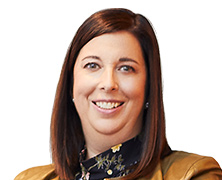My Mentor’s Bold Move
Early in my career in professional services, female role models were scarce. I often felt conscious of being the lone woman in a room filled with men. The women I did meet at work and in the financial services industry, however, helped me feel more comfortable speaking out about what I needed on a personal level from my organization and from my colleagues.
One of my earliest mentors was a female Ernst & Young LLP (EY) partner who profoundly impacted my life and career. Her strong personality and ability to build relationships with the client earned her a seat at the male-dominated table.
When I joined the firm full time in 1992, I watched as she navigated being the first EY partner to have a flexible work arrangement, allowing her the opportunity to be her best self at work and at home with her kids. I remember thinking that was a bold move, and it was a signal to her female colleagues that we could do the same. We could have children and our dream careers—the two were not mutually exclusive.
Fortunately, women like my early role model helped to make this mindset much more common today. In fact, I’m very proud of the diversity and female representation at EY’s partner level. It’s tremendous that we now have our first female CEO for EY Americas, which sends the message to our rising talent that there is no limit to what they can achieve at EY.
I don’t take this diversity for granted, however. We still have a long way to go, and as a female partner in a leadership role, I consider it a responsibility to pass on the values I learned from my female mentors to my mentees today.
To that end, I talk about my family openly and I’m transparent about both my professional and personal responsibilities. I want my teammates—men and women—to know that I didn’t give up a quality family life to get where I am today. And they don’t need to either.
Representation is a critical step to achieving gender parity, as it helps create a sense of belonging. If female leaders continue to keep an open dialogue with their teams, the next generation of women won’t feel conscious of their gender in the workplace. When they look around, they won’t be alone.
The views expressed by the author are not necessarily those of Ernst & Young LLP or other members of the global EY organization.







